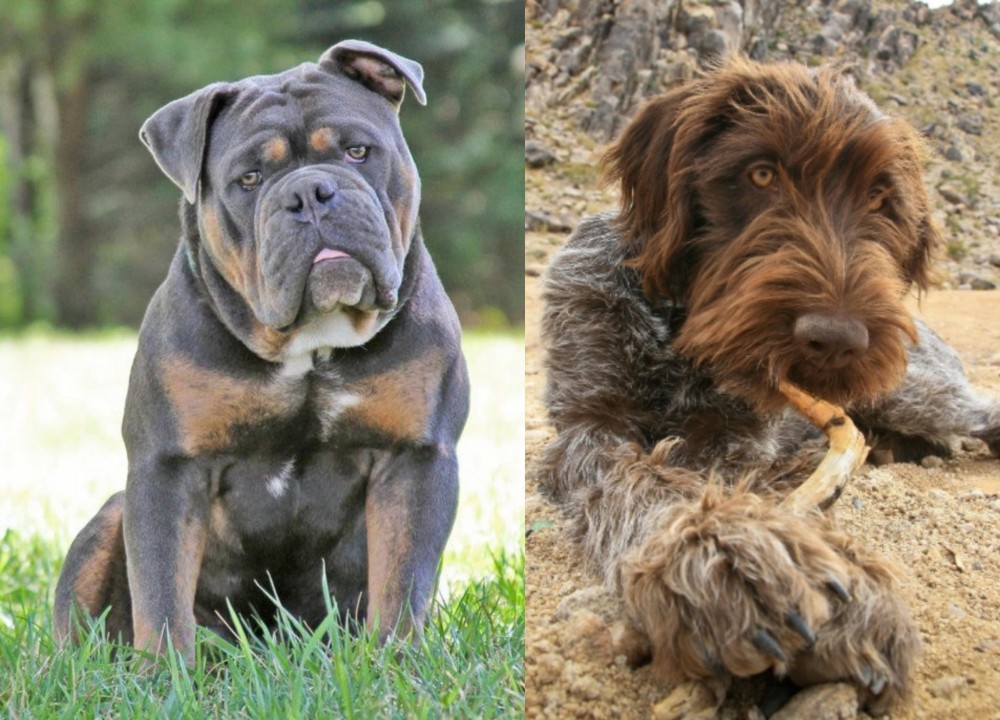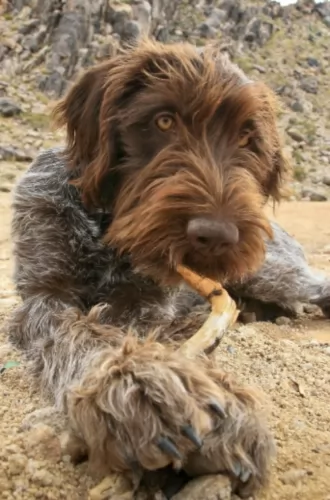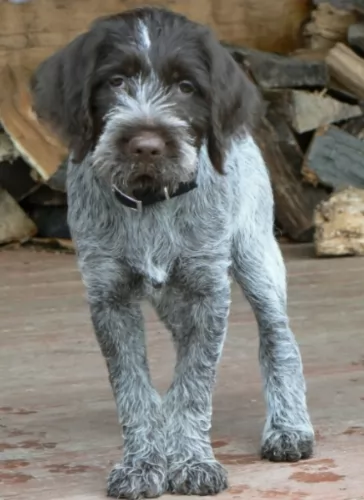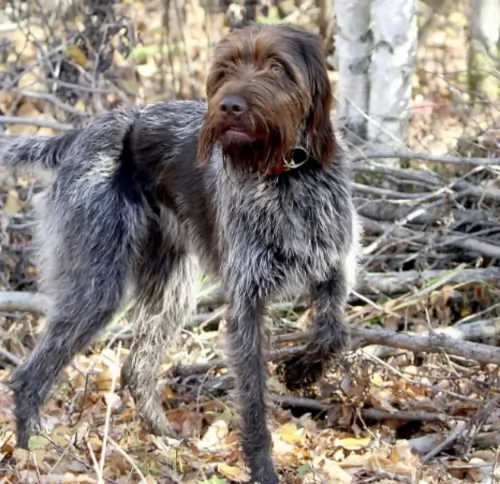 Petzlover
Petzlover Olde English Bulldogge is originated from United States but Wirehaired Pointing Griffon is originated from France. Olde English Bulldogge may grow 9 cm / 3 inches shorter than Wirehaired Pointing Griffon. Olde English Bulldogge may weigh 9 kg / 20 pounds more than Wirehaired Pointing Griffon. Both Olde English Bulldogge and Wirehaired Pointing Griffon has almost same life span. Both Olde English Bulldogge and Wirehaired Pointing Griffon has almost same litter size. Olde English Bulldogge requires Low Maintenance. But Wirehaired Pointing Griffon requires Moderate Maintenance
Olde English Bulldogge is originated from United States but Wirehaired Pointing Griffon is originated from France. Olde English Bulldogge may grow 9 cm / 3 inches shorter than Wirehaired Pointing Griffon. Olde English Bulldogge may weigh 9 kg / 20 pounds more than Wirehaired Pointing Griffon. Both Olde English Bulldogge and Wirehaired Pointing Griffon has almost same life span. Both Olde English Bulldogge and Wirehaired Pointing Griffon has almost same litter size. Olde English Bulldogge requires Low Maintenance. But Wirehaired Pointing Griffon requires Moderate Maintenance
 The Bulldog in general has undergone quite a few changes over the years and the Olde English Bulldogge was developed as a designer breed in the United States.
The Bulldog in general has undergone quite a few changes over the years and the Olde English Bulldogge was developed as a designer breed in the United States.
The dog was developed by David Leavitt in 1971, who crossed the English Bulldog with a Pitbull, American Bulldog and Bull Mastiff. Leavitt wanted a dog that would be free of the breathing problems bulldogs battle with. He also wanted the dog to be more nimble, more agile and more healthier.
Crossing the Bulldog, Bullmastiff, American Pit Bull Terrier and the American Bulldog, he developed the Olde English Bulldogge. The dog isn’t recognized as a breed by the AKC.
 Known also as the Korthals Griffon, the Wirehaired Pointing Griffon is a hunting- and gundog. It was Eduard Karel Korthals who is thought to have brought about this dog breed around 1873.
Known also as the Korthals Griffon, the Wirehaired Pointing Griffon is a hunting- and gundog. It was Eduard Karel Korthals who is thought to have brought about this dog breed around 1873.
He was a Dutchman living in France. It is believed that quite a few dog breeds were used to bring about this dog such as the Otterhound, Spniels, Setters and possibly a Pointer. The dog is known as a supreme gundog and it is a very popular dog breed.
Edward Korthals of Holland was looking for an ideal gun dog. It was in 1888 that the first Griffon Club was formed. It was only in 1916 that this dog was officially recognized as the Wirehaired Pointing Griffon in the United States.
 Olde English Bulldogges are purebred dogs. They are big boned, solid and muscular. They are medium sized dogs and stand at roughly between 40 and 51cm and weigh between 22 and 36kg.
Olde English Bulldogges are purebred dogs. They are big boned, solid and muscular. They are medium sized dogs and stand at roughly between 40 and 51cm and weigh between 22 and 36kg.
They have big, broad head and a furrowed face. The ears are fairly small and are semi-erect, semi-floppy. The neck is thick and powerful, the legs short and stocky. The coat is short and is usually white and tan, white and grey, brindle or solid colors of fawn, red and black.
The Olde English Bulldogge is a healthier, more active, athletic dog. It was given this name to differentiate it from the modern English Bulldog.
Olde English Bulldogges are gentle and good natured, snorting around and just dying for his human family to tickle his tummy.
He has an easy-to-please temperament and being intelligent, he will respond well to training and socialization.
He is adaptable and can settle into life in the city or in the countryside. He has strength and stamina but will do better with a walk as opposed to running next to you as you cycle - this will exhaust him and be unhealthy for him.
The Olde English Bulldogge is a sweet, friendly, confident but gentle dog known for his strength and stamina. They are friendly and outgoing, even being social and friendly around strangers. They get on well with children and pets in the home too and will make a wonderful pet.
 The Wirehaired Pointing Griffon or Korthals Griffon is a medium-to-large sized dog standing at between 50 and 60cm both male and female and weighing between 23and 27kg.
The Wirehaired Pointing Griffon or Korthals Griffon is a medium-to-large sized dog standing at between 50 and 60cm both male and female and weighing between 23and 27kg.
He has a wiry, somewhat harsh curly outer coat and a softer undercoat. The head is quite large. He has thick eyebrows and a beard. The eyes are brown with yellow irises.
This is a low-shedding dog. There are a few colors such as white and brown, white and orange but the coat is also steel gray with brown markings.
These dogs are intelligent and independent with a desire to please their owners. He is able to learn tricks and commands easily. They love their human families and want to be around them all the time.
It would be devastating for such a dog to find himself stuck in the backyard with no human contact. He is also not suited to cramped living conditions in the city but is essentially a country dog, especially since he has boundless energy.
As a family pet, he is playful, friendly, loyal, loving and gentle, behaving well with children and other pets. They’re not aggressive dogs but they make excellent watchdogs, barking if someone comes into their property.
 The Olde English Bulldogge is a gentle, sweet dog who just wants to be a loved member of your home. He wants to please, so training and socialization will do him the world of good as then he becomes obedient and responds easily to some basic commands.
The Olde English Bulldogge is a gentle, sweet dog who just wants to be a loved member of your home. He wants to please, so training and socialization will do him the world of good as then he becomes obedient and responds easily to some basic commands.
He has a protective nature and will do what he can to guard and protect you. Such a wonderful 4-legged friend and companion deserves your unconditional love.
 The Wirehaired Pointing Griffon has always been a great hunting dog and he doubles as an excellent pet and companion as well.
The Wirehaired Pointing Griffon has always been a great hunting dog and he doubles as an excellent pet and companion as well.
This dog is extremely loyal to his human family and is friendly, intelligent, loving and affectionate, getting on well with children as well as other pets in the home.
He can reach 14 years of age and doesn’t often get sick, making him an all-round great pet and companion.
 The Olde English Bulldogge can live to be 14 years old if he is looked after well. These dogs are prone to some of the typical dog ailments there are and bloat is one.
The Olde English Bulldogge can live to be 14 years old if he is looked after well. These dogs are prone to some of the typical dog ailments there are and bloat is one.
This ailment is also known as Gastric Dilatation Volvulus, a life-threatening disease regarded as a medical emergency. The stomach can twist, cutting off blood flow to the heart. It occurs more often in deep-chested dogs and you will notice the swollen stomach.
These dogs are considered to have less health issues than other brachycephalic breeds but still you need to keep an eye on their breathing. In fact, David Leavitt, who developed the dog says that this particular mix of dog doesn’t have the undesired negative health aspects of the dog’s relatives such as hip issues, difficult births and brachycephalic syndrome. They are also far more tolerant to heat and cold that other bulldog types.
 There are a number of things you can do to make sure your Old English Bulldogge settles down nicely into his new home.
There are a number of things you can do to make sure your Old English Bulldogge settles down nicely into his new home.
With his short coat, he isn’t described as being hypoallergenic, but the coat is looked upon as not triggering allergies as much as some of the other dog breeds. He will simply require a brush twice a week.
Make sure to take your 8 week old puppy to the vet to check him over and to start with his first vaccines to avoid him getting some of the life-threatening illnesses there are. He will also be de-wormed. Later on as an adult, he or she will need to be neutered or spayed to prevent puppies.
Never leave your dog in a car on a hot day. It can kill him. Rather leave him at home.
Feed your Olde English Bulldogge a balanced diet that provides him with the right amount of minerals and vitamins. The top ingredients of commercially manufactured pet food must be meat. You can add some home-made food into his kibble as a treat as well as some raw meat occasionally. Chopped up boiled chicken, brown rice or pasta and vegetables such as spinach, sweet potato and carrots will be excellent for him. You can also look at the possibility of giving your dog a supplement. Make sure he has a constant supply of fresh, cool water.
 This dog loves his exercise, and if you live in the country so much the better. He will love to go hiking and swimming with you or running next to you as you go cycling. He also loves all kinds of rope- and ball games in the garden. It’s why this active dog isn’t ideal for life in the city.
This dog loves his exercise, and if you live in the country so much the better. He will love to go hiking and swimming with you or running next to you as you go cycling. He also loves all kinds of rope- and ball games in the garden. It’s why this active dog isn’t ideal for life in the city.
Spay or neuter your pet if you don’t want unwanted puppies. Don't do it too early. Speak to your vet about the procedure and about the health benefits that come from spaying and neutering a dog.
These are active dogs and they will require top quality food if they’re to remain healthy and active.
Always check the packaging to see what ingredients are present in your dog’s food. Some of the cheaper, more inferior brands can actually be harmful to your pet with their useless ingredients devoid of vitamins and minerals.
Some home-made food is good and this needs to be plain and free from spicy additives. Dogs have sensitive stomachs and anything unusual can cause them digestive problems.